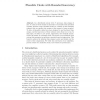Free Online Productivity Tools
i2Speak
i2Symbol
i2OCR
iTex2Img
iWeb2Print
iWeb2Shot
i2Type
iPdf2Split
iPdf2Merge
i2Bopomofo
i2Arabic
i2Style
i2Image
i2PDF
iLatex2Rtf
Sci2ools
113
click to vote
WDAG
2005
Springer
2005
Springer
Plausible Clocks with Bounded Inaccuracy
In a distributed system with N processes, time stamps of size N (such as vector clocks) are necessary to accurately track potential causality between events. Plausible clocks are a family of time-stamping schemes that use smaller time stamps at the expense of some accuracy. To date, all plausible clocks have been designed to use fixed-sized time stamps, and the inaccuracy of these schemes varies from run to run. In this paper, we define a new metric, imprecision, that formally characterizes the fidelity of a plausible clock. We present a new plausible clock system that guarantees an arbitrary constant bound on imprecision. This bound is achieved by allowing time stamps to grow and shrink over the course of the computation. We verify the correctness of our algorithm, present results of a simulation study, and evaluate its performance.
| Added | 28 Jun 2010 |
| Updated | 28 Jun 2010 |
| Type | Conference |
| Year | 2005 |
| Where | WDAG |
| Authors | Brad T. Moore, Paolo A. G. Sivilotti |
Comments (0)

